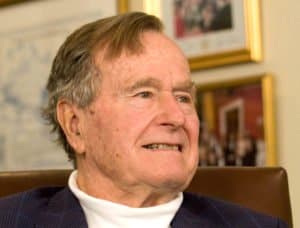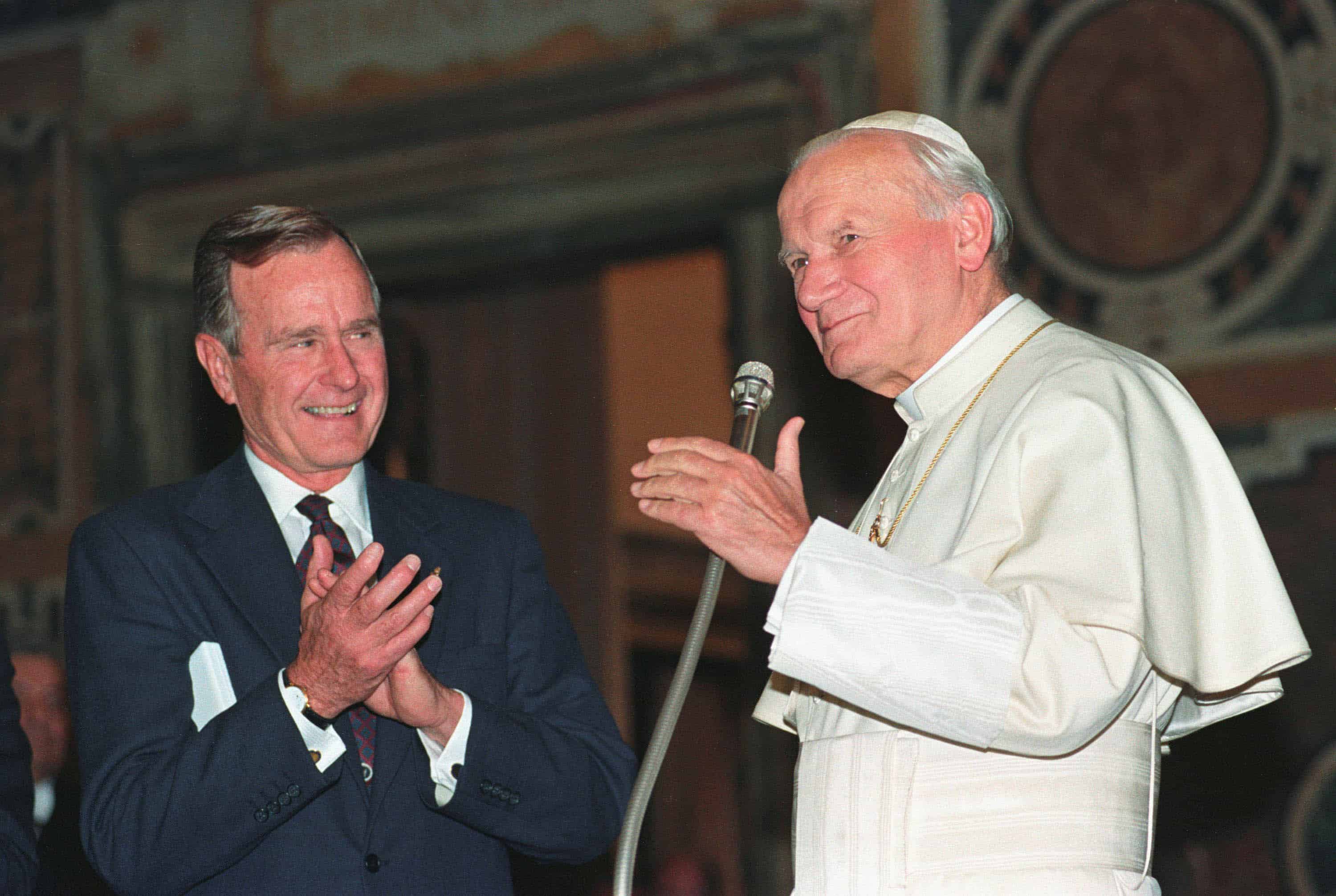At a particularly low moment for the Republican party, then New York governor Nelson Rockefeller was asked to “summon that fabled nexus of money, influence, and condescension known as the Eastern Establishment.” To which Rockefeller replied: “You’re looking at it, I’m all that is left.”
With the recent passing of President George Bush Sr., the Rockefeller, or Country Club Republicans, have at last gone extinct. It is a species of Republican that a younger generation of Millennials would have a hard time recognizing on today’s political spectrum, even though by the early 1970’s it continued to dominate the GOP. They were center-right on economic issues, and tended to hold socially progressive views, if they held views on social issues at all. The line between this species of Republican and Secretary Hillary Clinton might from a distance be obscured. It was perhaps not, therefore, surprising when Bush Sr. revealed that he had crossed party lines to vote Democrat in the 2016 presidential election.
But this extinct species had another now unrecognizable element: It was dominated by WASPs (White, Anglo-Saxon, Protestants). The acronym is incomplete. President Richard Nixon was white, of English heritage, and Protestant; he would not have qualified. He was a self-made man from the West coast who attended public schools; a WASP is something into which one is born. They have always been, therefore, a minority; though I’m sure they would prefer the term ‘club’.
The WASP establishment once dominated the political and economic life of the United States. It was the closest thing we had to an aristocracy: wealth and privilege based upon lineage. By the middle of the 20th century, WASPs held all but one of the Supreme Court positions, dominated the State Department, the CIA, and a myriad of other government institutions and positions which required appointment, rather than election.
By the end of Bush Sr.’s first, and only, term as President in 1992, the WASP establishment was a spent force. The upward mobility of other ethnic groups, especially Irish and Italian, had dislodged the WASPs from political dominance. The Ivy League schools (once WASP institutions), and the Northeast boarding schools which fed them, had since dropped their quotas on Catholics and Jews. And the wealth created by the 1980’s stock market, as well as the burgeoning tech industry, had long since out-earned those individuals whose money was ‘old’.
 Born into a politically-prominent New England family, George Herbert Walker Bush could trace his ancestry to the last governor of Plymouth Colony in the 17th century. His father, Prescott Bush, represented Connecticut in the U.S. Senate. He prepped at Phillips Academy and, after serving as a naval aviator in the Second World War, graduated from Yale: superb WASP credentials. In fact, Bush’s career largely followed the changing fortunes of the WASP establishment to which he belonged. After serving briefly as a one-term congressman, Bush began the cursus honorum of appointed positions that were the hallmark of his caste: U.N. Ambassador, Chairman of the Republican National Committee, Envoy to China, and Director of the CIA. But by the time he was ready to make a bid for the presidency in 1980, the political landscape in which he grew up had changed. More conservative forces within the Republican party had coalesced around a former governor of California, Ronald Reagan, and it was clear that the Rockefeller Republicans’ days were numbered. Realizing he could not win, Bush pulled out of the race, but was invited by Reagan to join the Republican ticket for Vice President, the last olive branch offered to the old guard.
Born into a politically-prominent New England family, George Herbert Walker Bush could trace his ancestry to the last governor of Plymouth Colony in the 17th century. His father, Prescott Bush, represented Connecticut in the U.S. Senate. He prepped at Phillips Academy and, after serving as a naval aviator in the Second World War, graduated from Yale: superb WASP credentials. In fact, Bush’s career largely followed the changing fortunes of the WASP establishment to which he belonged. After serving briefly as a one-term congressman, Bush began the cursus honorum of appointed positions that were the hallmark of his caste: U.N. Ambassador, Chairman of the Republican National Committee, Envoy to China, and Director of the CIA. But by the time he was ready to make a bid for the presidency in 1980, the political landscape in which he grew up had changed. More conservative forces within the Republican party had coalesced around a former governor of California, Ronald Reagan, and it was clear that the Rockefeller Republicans’ days were numbered. Realizing he could not win, Bush pulled out of the race, but was invited by Reagan to join the Republican ticket for Vice President, the last olive branch offered to the old guard.
By 1988, everything Bush represented seemed to be a liability. His WASP credentials, which might have aided him a generation before, became a millstone. He was ‘elitist’, ‘out of touch with the common folk’, and the new Reagan Republicans were suspicious of his conservative credentials. His presidential election came at a cost: He was a Rockefeller Republican expected to be Reagan’s ideological successor, he was a WASP expected to be more down to earth, and he was a foreign policy diplomat expected to focus on souring domestic issues. In short, he was expected to be something he was not. Though leading the country though its last successful war, and skillfully managing the decline of the Soviet Union, Bush broke an explicit campaign promise not to raise taxes. He did this for the now politically unforgivable reason that he thought it was right.
Much has been written on the demise of the WASP from political life, and most of it bears the subtext ‘good riddance’. As a group the WASPs have many faults: they tend to be elitist, exclusionary, and inert to change. But this depiction, often parodied and lampooned, does not do the group justice. They are also polite, civil, civic minded, scrupulously modest, and raised with a strong sense of noblesse oblige. Their motto could be to whom much has been given, much will be expected. The ultimate test for the WASP was putting one’s country before one’s private interest, even in the face of grave temptation, as when Attorney General Elliot Richardson resigned, rather than obey Nixon’s order to fire the Watergate special prosecutor. Or when CIA Director William Colby was honest about the CIA’s sordid past in public congressional hearings because it offended his sense of duty and character to lie.
It might be said that I am painting too sympathetic a picture of this endangered class, and this is perhaps true. Yet it is easy for me to believe that Bush Sr. raised taxes for the same reason that he took on the thankless job of Republican Party Chairman during the Watergate scandal, for the same reason why he agreed to head the CIA after their public humiliation, and for the same reason why he, alone among Republicans, stood on the tarmac to say goodbye to the deeply unpopular Democratic President Johnson when he departed office in 1969: because he thought it was the right thing to do.
There is a story from Bush’s youth which is telling. Having once bragged to his mother that he had scored three goals in a soccer match, she replied “That’s nice, George, but how did the team do?”


